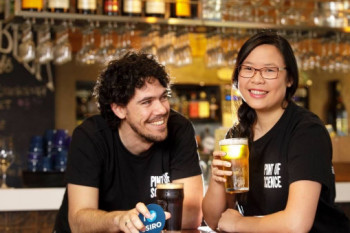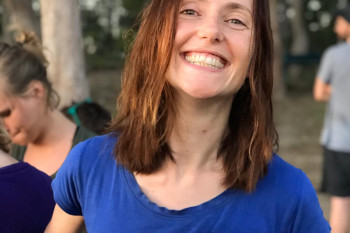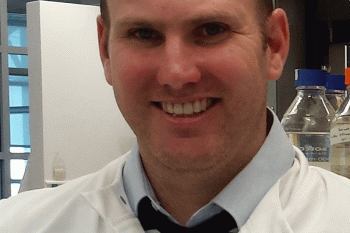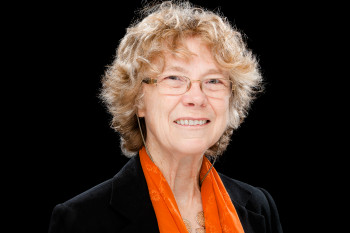© Pint of Science, 2025. All rights reserved.
Coastal Matters
Professor Troy Gaston with Dr Nattai Borges
Associate Professor Troy Gaston is a marine ecologist who has a lifelong passion for understanding the ocean and marine life. In this episode Troy discusses his local collaborative projects aimed at understanding and preserving local waterways.
Due to wet weather, this episode was filmed in the Marine Science laboratory at the University of Newcastle, Ourimbah campus. As a result, no warm beverages were allowed on set but it allowed a cameo from Jasmine the Remotely Operated Underwater Vehicle!
~~
You can find out more about Troy at his university profile page.
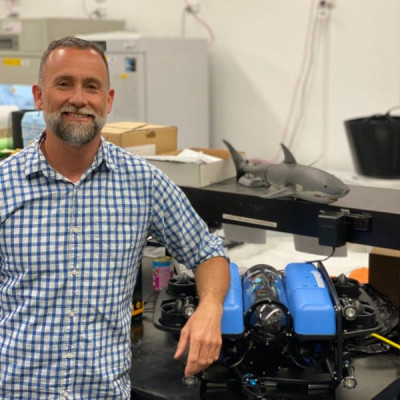
~~
Transcript
Associate Professor Troy Gaston: Continue to extract what we call ecosystem services from the environment we get clean air we get food we get all these raw materials for building everything that's around us we want to keep getting those ecosystem services but that needs to be sustainable
Dr Nattai Borges: Hi everyone and welcome to mug of science a pint of science initiative where we chat to local scientists over a morning cuppa. Today we're at the Ourimbah campus at the University of Newcastle, unfortunately it was raining outside so we had to relocate into the lab but we're making the best of it. We're in the beautiful marine science lab at the Ourimbah campus and I'm lucky enough to be joined today by Associate Professor Troy Gaston from the Department of Marine Science and we are going to be talking about all things coastal. Troy, thanks for coming we start every interview with the same question and that question is what is in your mug?
Troy: No mug, it's water yeah but we're in a lab, no drinking and I notice your mug's empty
Nattai: We are following occupational health and safety procedures
Troy: so we are not allowed any liquid no liquid
Nattai: No liquid, also we've got a little friend here, would you like to introduce your friend?
Troy: Yeah this is Jasmine, Jasmine from the movie Aladdin we have Jasmine Aladdin and Genie now this is an ROV remotely operated vehicle, scuba diving a bit of an OH&S issue because you're in a non-breathable environment but we can take Jasmine here to 100 meters depth not a problem. She provides a live feed to the surface for the camera here we've got the lights and this this particular ROV you can move in any plane and direction and it has fantastic stability and if anything goes wrong it's on a tether you can just bring it back to the surface. We've even got an arm we can put on it for grabbing samples as well but it allows us to also do a lot of mapping, yeah underwater video and mapping one of the first things we need to know is what do we have in the marine environment? Jasmine here is our first step in collecting all that data
Nattai: Yeah I can imagine it increases the access you have to those local environments
Troy: Absolutely and if you are good with a playstation you'd be good at driving jasmine, I am not, so i'm not allowed to drive jasmine.
Nattai: You don't have your jasmine license?
Troy: I do not have my jasmine license, i'd probably crash her into something so i'm not yeah this is for the young kids
Nattai: Why don't you tell us a little bit about yourself? Tell us about um who you are as a person and what brought you into science and to where you are now.
Troy: I come from a family of scientists so I was pretty much just bred to be another scientist. My brothers are engineers and scientists, computer scientists one of them is a rocket scientist but I had a love for the ocean. As a kid my parents struggled to keep me out of the water especially the beach and I love science so I just combined the two and marine science was just a great fit and I really picked up on that because I loved fishing with my grandfather and my dad taught me how to scuba dive or snorkel and then scuba dive it was all just starting to make sense and when I was scuba diving, I would just sit on the bottom blowing bubbles why is that fish doing that? what's going on with that reef over there? I just wanted to know how things worked in the ocean.
Nattai: You just had that scientific curiosity
Troy: Yeah it might start with just building lego, how can I put these different things together?
Nattai: I think that's really interesting, I think that's a a common pathway for a lot of scientists just as a kid trying to figure out how the world around you works and obviously yours was located in the ocean
Troy: Oh absolutely my grandparents lived on the waterfront, every Christmas holiday was down the south coast New South Wales at the beach or in the airstream yeah so I was always around the ocean it was, yeah salt water in my in my veins
Nattai: And that obviously put you on the path towards becoming a marine scientist marine? Biologist? um I don't know if there is a distinction
Troy: There is actually a distinction so marine biologist is just the plants and animals and I guess marine scientist sits above that and it's it might be marine chemistry it might be how they're just the oceans and currents work and tides it might be how sediments move so they're all components of marine science, a marine biologist well they focus on the biology sure I guess I'd almost be classified as a marine ecologist, which is how animals plants the ecosystem the habitats the water column the centers how everything interacts and works yeah the full ecosystem the full ecosystem.
Nattai: Yeah absolutely, awesome. So tell us a little bit about how you got started I guess you had initial love for the ocean trying to figure it all out, I guess at some point you started university and you went through your phd. So tell us a little bit about that.
Troy: I loved science at school so I was one of those weird kids that actually loved chemistry and biology
Nattai: I think we were all that kid
Troy: Yeah I'm pretty sure everyone listening to this is probably loves science. At the end of high school I still wanted to go and do more. I just wanted to learn more and it was focused around science so I thought well I love the ocean can I bring the two together and that was quite obvious that marine science was going to be an option for me there's actually not a lot of places in Australia that explicitly study marine science, so I went off to uni absolutely loved it worked out during my undergrad I really want to focus on coastal ecosystems. So in Australia it's now over 80 percent of our population live within a 50 kilometre stretch well within 50 kilometres off the coastline that's intense from our perspective but when you look at places like Hong Kong or New York it’s just insane how many people are living in that coastal zone. So we're obviously to have some effect what are they? can we mitigate? do we can we adapt to what's happening in the oceans? uh whether you believe in climate change or not the oceans are rising they always have they will again but they're rising a whole lot faster than they ever have before and that's an issue for us how do we adapt to that? Mitigation seems to, it's quite difficult because there's a political will behind the mitigation but adaptation so how are humans interacting with the coastal environment? What effects or are we having? We can have both positive and negative. My phd was around sewage effluent that was a very obvious negative effect we have to discharge it somewhere but is there a positive effect of putting sewage effluent into the ocean you break it down it's fertilizer
Nattai: it's fuel
Troy: Yeah it's fuel for the ocean, it's carbon it's nitrogen they're two of the most important nutrients that the ocean needs to grow.
Nattai: So is it a matter of dosage or kind of rates of release?
Troy: it's a bit of both, our oceans around Australia are actually nutrient poor just because of where we sit in the South Pacific and with the Indian Ocean so we're actually fertilizing our coastal oceans and if we do it at coastal seas if we can do it in such a way that there'll be no adverse negative effects same as we fertilize our lawns our gardens if you do it at the right time when everything wants to grow and we also look at how we're just applying that fertilizer then we can have a positive effect on our coastal seas and I actually found in my phd that a lot of the tissues the proteins amino acids in fish originated from human sewage okay but those fish are perfectly fine to eat sure so the nutrients have just made their way up the food chain into the species we like to eat
Nattai: okay so it's almost
Troy: There's a full circle of life going on here which some people might go “oh i'm not gonna catch and eat anything off Sydney” but there's no metals there's no bacteria in those fish they're perfectly fine to eat it's just where did that carbon and nitrogen come from that supports that food.
Nattai: that's the circle of life isn't it
Troy: Absolutely I'm pretty sure there's a movie about that
Nattai: yeah I think so, from a couple years ago. Cool I think that sounds great, um yeah sorry what were you going to say?
Troy: So that's the first thing I got into and it just led me on to how else are we actually having an effect positive or negative on our ecosystems and one of my main areas of research now is can we repair our ecosystems? The UN, so the united nations have declared an international decade of ecosystem restoration and that's a global initiative as both aquatic and terrestrial just because of degradation of our systems. Now Australia, yes we've had degradation of our ecosystems not to the extent of other continents but certainly enough that we've seen negative effects from the environment. One that resonated with me and probably and would resonate with a third of Australians is the ability to go and do some recreational fishing it's a huge industry third Australians do it every year, we always wanted to catch fish. In my lifetime I've noticed there's just not as many fish that's not because I suck at fishing maybe I do but you have people who are like “back in my day I used to catch all these fish” everyone's heard those stories yeah, used to catch fish this big
Nattai: Two-foot barra
Troy: Yeah when they do that just look where their thumbs are because that's the actual size of the fish, not where their index fingers
Nattai: Hot tip
Troy: So how can we get some of that productivity back? so a lot of our work is around and one of my interests around ecosystem or habitat repair restoration implies we'll get it back to what it was before humans started to have an effect which would be really difficult. Have a look at the amount of land clearing the amount of dredging the amount of coral reef destruction just so we get access to coral islands and what rehabilitation improvement can we do it could be a five percent improvement? a 10 20 30? Similar to the co2 emission targets how much of a reduction do we want? We can be aspirational or can it be achievable so I look at that from an ecosystem perspective what could we achieve in repairing our systems
Nattai: So when you say a five or ten percent improvement what are we actually looking at what are we measuring or trying to quantify?
Troy: At that point so there's a few different things you could actually refer to when we want some improvement is it five percent improvement in water quality? so do we want the water to be clearer? 20% reduction in nutrients? We could do that do we actually want a an increase in fishing output? so how do we actually maybe increase fish biomass or fish abundance so there's a few different things we could actually ask. In regards yeah and I love recreation fishing heaps of Australians do so can we get fish for the future which is a catchphrase that a lot of government entities use
Nattai: And you work locally with a lot of local community groups and government agencies as well?
Troy: Absolutely, local councils yeah they get banged on the head a lot for either not doing something or doing something wrong but they're quite often the link between the general community and what's actually going on in the environment and they actually do lots of good work
Nattai: Yeah and they're very supportive
Troy: They are very supportive of the research because they understand that science-based policy science-based management science-based decisions is where we have to go where is that empirical evidence that's being collected in a scientific manner so it's robust defensible this is going to be the best way for it
Nattai: So how far do you think along the path of us having this you know relationship with local government agencies to drive policy are we in an initiation phase or do you think we're pretty well down the track that we can maybe start to see some I guess more systemic change or benefits coming?
Troy: We're definitely not at the beginning we've got pretty much all the coastal councils in New South Wales are very proactive about protecting the asset and our ecosystems are an asset everything we do in society economics productivity you don't have a functioning ecosystem or environment, you're not gonna be able to do any of that and there might be a lag effect because the ecosystem takes a while to respond but eventually you screw up the environment. So we've got a lot of great support and just the way we do ecosystem management in New South Wales there needs to be some science underpinning right this is what we're going to target next we don't know how that works or how do we focus our efforts to fix that problem so there's a couple of ways we can approach the problem all scientific approaches, how do we fix that? or how does that work? how do we change that? why did that do that? and we've been working with council state government even not-for-profit organisations such as Ausfish, which supports the recreational fishing industry. They want to know a) how can our members help you with scientists? so citizen science but also what information do you need so you understand how the ecosystem functions? so we can have a better recreational fishing resource, so pretty much everyone's on board yeah so we're actually along that timeline, uh further than a lot of people would think and we're beginning to now understand you want to fix this habitat or you want to fix this waterway here's one place you could target and get a good bang for your buck straight away
Nattai: okay cool, could you give me maybe an example of one of those initiatives that you have kind of happening with some local partners? And then maybe are there like one or two things that I guess myself or anyone as an individual like what we can do to maybe have a beneficial impact on our local environment?
Troy: I always get asked those questions what is it I can do? well you can always go to uni become a scientist and get on board, that's one thing but a good example, a lot of our estuaries in New South Wales we've lost nearly 70% of fish habitat and that's directly from human activities some of those activities which are land-based and higher in the catchment are not likely to go away we can do them a bit better but how do we get those habitats back which will then flow on to just fishery productivity and fish biomass? because there are two things lacking in aquatic environments food and habitat and things like seagrass mangrove salt marsh which we call habitats are also food we understand and a lot of recreational fishers know where certain species of fish hang out are they in the seagrass do they like to be near the mangroves are they just hanging on the sand bank like flat head like to do once we know so we know that where they like to be yeah what are they eating yeah so food could be limiting so which of those habitats is most important for food and we've been working with a local council, state government and the not-for-profit organizations in a couple of different estuaries okay which habitat's most important we've actually identified it as to being salt marsh which is that low-lying plant that is highest on the intertidal it's closest to where we live and it’s the first thing to go with coastal urbanisation or any form of urbanisation and it's called "coastal squeeze" so here's the fence here's the salt marsh as the sea level rises salt marsh has got to keep moving up the shore, it can't there's a fence we built there or we put a rock wall or there's a park or something else going on so that habitat is actually squeezed out of existence. So we're working with coastal engineers about identifying where in the catchment and they're also called or eco engineers and hot and eco hydrodynamics said where does the water go where is it likely to go where in a in an estuary or a catchment, could we could the council as the government buy back land and allow these habitats to actually return and move up the shore with rising sea levels
Nattai: So that seems to be the solution just, it needs the land there's no there's no way around it?
Troy: Absolutely or the other option is retreat get those people to sell up their houses and move somewhere else okay good luck with that one let's move that park let's move that shopping center let's move that car park, possibly not going to happen so it's a balance.
Nattai: I mean it's interesting because you're what you always hear about community initiatives to build walking paths you know along nice bits of waterways because it's you know it promotes activity and all these other social benefits but you never think about well what are the actual ramifications of that on the ecosystem, we tend to think only of ourselves I guess.
Troy: Oh we're always thinking what's the socio-economic benefit or typically the economic benefit I love footpaths and boardwalks near waterways because people get to see what it is we're trying to protect and we can actually build them in a way that has can actually provide a positive outcome and as an example we did some work looking at private jetties in lake macquarie and it provides additional habitat that wasn't normally there it's like having a reef in the sea grass now we can build the jetty out of materials so it allows enough light through doesn't damage the sea grass you're now providing additional structures which things grow to and brings in other species of fish because they like to hide a round structure that's basically a fish aggregation device or a fish attracting device the island nations have been using them for 60 000 years throw a few palm fronds in the ocean fish will come to it.
Nattai: It creates an artificial reef or it's like it's an artificial habitat?
Troy: Yeah so we can actually put coastal structures in that have a positive benefit, we just need to do more of it
Nattai: and that obviously starts at a government policy level? in terms of what actually gets built on on our coastal ways
Troy: Well it could actually go back one step and say it starts with the science, how's this what sort of effect is this going to have on the environment? and then we pass that data on to the government yeah okay is this within your planning laws you can do it okay so we've provided that feedback to lake Macquarie city council and they can think, all right is it the number of jetties that might actually have an impact on the environment not just a single jetty? so that's the next stage of the research the next stage of the science how much is too much
Nattai: Yeah that's really interesting I think that's a perspective that I would never have you know come to myself particularly appreciating the waterways and what goes into understanding and then hopefully trying to create infrastructure essentially to make sure that yeah we keep it into the future
Troy: Absolutely most of our science is applied, how is it going to benefit humans but it still has the crux of it the environment has to not be affected here
Nattai: Yeah well it's symbiotic right because we need we need the environment
Troy: That's a really big part of it and we influence on the environment so um well we're going to continue to extract what we call ecosystem services from the environment we get clean air we get food we get all these raw materials for building everything that's around us we want to keep getting those ecosystem services but that needs to be sustainable.
Nattai: That's great yeah we are part of the ecosystem
Troy: Absolutely
Nattai: All right Troy well thanks so much for your time today, I guess we try to wrap up every episode by asking the same question and the question is for you a scientist is someone who…
Troy: Loves to know how things work and you approach that problem in what we would call the scientific method. The scientific methods a process of how you tackle a problem how do you figure out.
Nattai: it's a curiosity
Troy: It is curiosity and how do you figure out how something works yeah it's the best
Nattai: Yeah, well thanks so much for your time if anyone wants to get in touch with you or in contact is there a preferred way to reach out to you?
Troy: If they jump on the uni Newcastle website and just type in my name the profiles there the work we're doing and there's a range of contact details there if they've got any further questions
Nattai: Great well thanks so much thanks for your time I hope you enjoyed it
Troy: Always, always love talking about science
Nattai: All right thanks everyone for watching, we'll see you in the next one!
